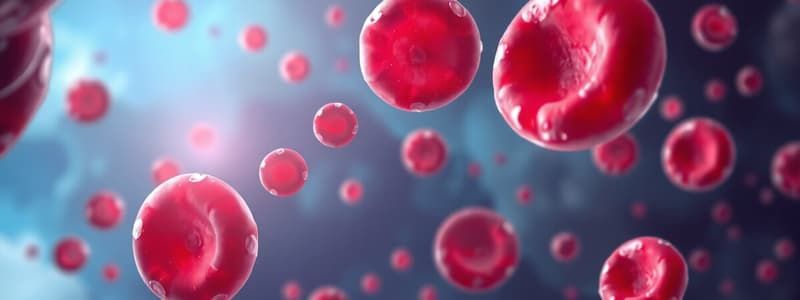Podcast
Questions and Answers
What is the primary role of haematinics in the body?
What is the primary role of haematinics in the body?
- To facilitate muscle contraction
- To enhance nerve function
- To provide energy for cellular respiration
- To assist in the production of blood cells (correct)
Which of the following is NOT considered a haematinic?
Which of the following is NOT considered a haematinic?
- Iron
- Folate (B9)
- Vitamin D (correct)
- Cobalamin (B12)
When might haematinic measurements typically be requested?
When might haematinic measurements typically be requested?
- To investigate nutritional anaemias (correct)
- To assess bone density
- To evaluate kidney performance
- To monitor liver function
What is a potential shortcoming of haematinic measurements?
What is a potential shortcoming of haematinic measurements?
Which of the following nutrients is involved in the absorption of iron?
Which of the following nutrients is involved in the absorption of iron?
What type of blood picture is typically associated with nutritional anaemias?
What type of blood picture is typically associated with nutritional anaemias?
Which two vitamins are most commonly associated with nutritional anaemias?
Which two vitamins are most commonly associated with nutritional anaemias?
What additional tests may be requested alongside haematinic measurements to aid in diagnosis?
What additional tests may be requested alongside haematinic measurements to aid in diagnosis?
Which component is essential in the transport of iron in the blood?
Which component is essential in the transport of iron in the blood?
What can haematinic measurements promote in the body when administered?
What can haematinic measurements promote in the body when administered?
Flashcards
Haematinics
Haematinics
Nutrients essential for the production of blood cells in the bone marrow.
Iron
Iron
Iron is a crucial haematinic involved in the synthesis of haemoglobin, the oxygen-carrying protein in red blood cells.
Ferritin
Ferritin
A protein that stores iron in the body, providing an indicator of iron stores.
Transferrin
Transferrin
Signup and view all the flashcards
Transferrin Saturation
Transferrin Saturation
Signup and view all the flashcards
Cobalamin (B12)
Cobalamin (B12)
Signup and view all the flashcards
Folate (B9)
Folate (B9)
Signup and view all the flashcards
Haematinic Measurements
Haematinic Measurements
Signup and view all the flashcards
Nutritional Anaemias
Nutritional Anaemias
Signup and view all the flashcards
Reticulocyte Response
Reticulocyte Response
Signup and view all the flashcards
Study Notes
Investigating Nutritional Anaemias
- Nutritional anaemia results from deficiencies in nutrients essential for blood cell production.
- Haematinics are nutrients needed by the haematopoietic tissue to produce blood cells.
- Common haematinics include iron, vitamin B12 (cobalamin), and folate.
- Iron measurements include ferritin, transferrin, and transferrin saturation.
- Cobalamin is also known as vitamin B12.
- Folate, also known as vitamin B9.
- Other B vitamins (B2, B3, B6) are also involved.
- Vitamin A, Vitamin C, Vitamin E, Copper (through Hephaestin and ceruloplasmin), and Cobalt are also considered essential in blood cell production.
- Haematinic measurements help identify nutritional anaemias. However, these measurements can lack the sensitivity and specificity for a definitive diagnosis.
- Additional tests are often required to confirm diagnosis.
- Complete Blood Count (FBC) and blood cell morphology are important considerations before haematinic measurements.
- Haematinic treatments can promote reticulocyte response, increase haemoglobin concentrations, resolve cytopenias, and correct/partially correct clinically relevant symptoms.
- Nutritional anaemias are often associated with microcytic or macrocytic blood pictures, although this isn't always the case.
- Haematinic measurements may be performed in haematology or biochemistry laboratories, depending on the lab's structure.
Studying That Suits You
Use AI to generate personalized quizzes and flashcards to suit your learning preferences.




